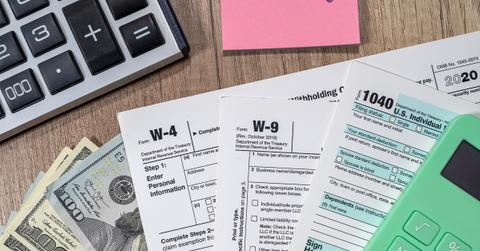If Your Income Is $40K, Here's How Much of a Tax Refund You Can Expect
The average tax refund for a $40,000 income may be less than you'd expect this year, thanks to several deductions ending. Here's what we know.
Feb. 17 2023, Published 11:04 a.m. ET

Filling out your tax forms carefully and accurately may help increase your refund, especially if you qualify for deductions.
During tax season, Americans want to know a few things, in particular how much of a refund they might get and when it will arrive. Although everyone's tax return will look slightly different, it can be helpful to have an idea of what's typical. Check out the average tax refund for a $40,000 income and other income levels.
Whatever your income, the first way to calculate your federal tax refund is by using the federal tax brackets for the tax year 2022. Not all dollars of a person's income are taxed at the same percentage. In 2022, a single filer pays 10 percent in federal taxes on the first $10,275, and the rates increase for different income levels.

A tax form.
What is a typical tax refund?
There are so many variations that impact how much of a refund you'll receive. You must calculate your taxable income and include any applicable deductions — and deductions and tax laws are prone to changing from year to year. That said, Motley Fool reported that the average tax refund in 2022 (for the 2021 tax year) was $3,039.
For your 2022 taxes that you'll file in spring 2023, refunds may be smaller on average due to fewer tax credits and deductions. There are changes to the Child Tax Credit, Earned Income Tax Credit, and Child and Dependent Care Tax Credit for the 2022 tax year. Plus, only those who itemize can claim charitable deductions for 2022.

Charitable deductions may not reduce your taxable income if you need to itemize in order to claim them.
As of Feb. 3, 2023, the average tax refund is $1,963. That's across almost 8 million total returns processed, across all income levels, not only those making $40,000. Since it's early in tax filing season, this average amount could change.
The average tax refund often increases with income. Motley Fool reports that in tax filing year 2019, these were the following average refund amounts:
- $0–$24,999.99 income: $1,668
- $25,000–$49,999.99 income: $2,232
- $50,000–$74,999.99 income: $1,992
- $75,000–$99,999.99 income: $2,193
- $100,000–$199,999.99 income: $2,222
- $200,000 and up: $4,334

Direct deposit won't increase your refund, but it should help you to receive it more quickly.
How do I calculate my tax refund?
Not everyone receives a tax refund, of course — many filers owe money to the IRS. This depends on your withholding throughout the taxable year. In general, you must input all of your income on your federal tax forms and include any deductions or credits you may qualify for. If it ends up that you've paid more than your federal taxes owed, you get a refund from the IRS.
What is the average tax refund for someone making $40,000?
According to Forbes Advisor, a single person filing who lives in California, with a $40,000 income, would be taxed about $3,911. However, this doesn't take into account deductions you might qualify for, and how much tax you've already had withheld during the year. All of those factors will impact the amount, if any, you'd get in a tax refund.
Motley Fool also notes that the average tax refund on income from $40,000 up to just below $50,000 was $1,969 for the 2019 tax year. Someone earning between $30,000 and $40,000 annually had a slightly higher average refund of $2,287.

Planning how to spend your refund? Know how much to expect based on income and deductions.
How can I get a bigger tax refund?
While you can't change how much you've already paid in federal taxes, you may be able to increase your tax refund for tax year 2022. Check over your tax return carefully if you're preparing it yourself or hire a professional to ensure no important deductions or credits are missed.
Even if you don't expect to be entitled to a refund, be sure to file a tax return anyway. Pay special care to any life changes (or policy changes) that may impact your eligibility for certain deductions and credits, which can reduce the total amount of your taxable income.
